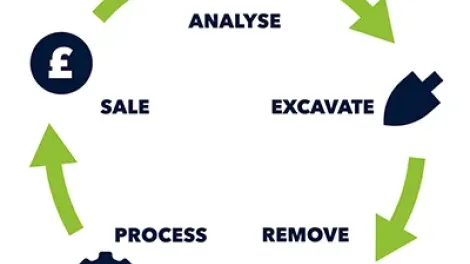procurement power can drive circular change - if claims are verified
New research commissioned by Holcim exposes a striking shift in the construction industry: a growing number of professionals are willing to pay a premium for genuinely circular credentials. This shift could influence forthcoming procurement guidance, framework renewals and supplier pre-qualification criteria across UK construction.

The findings come from Holcim UK’s annual Circularity Survey, which polled 500 UK decision makers from across the construction industry, including architects, building contractors, and haulier merchants.*
The Circularity Survey was commissioned to help industry and government understand the barriers preventing greater awareness and adoption of circular products and provide an annual benchmark for progress. It forms part of Holcim’s wider strategy to develop a closed-loop supply chain, including significant investment in its ECOCycle® range, which recycles construction demolition materials into new building solutions.
The survey indicates that robust circular credentials are increasingly valued across the construction industry, suggesting that circular practices are now seen as a key value-add rather than an optional or peripheral consideration.
The survey demonstrates the role that shifting expectations are having on procurement policies in local government, housing associations and large businesses resulting in a favourable tilt towards circular suppliers. A reassessment of these policies will prioritise suppliers who can evidence circularity in their operations, products and services. But, to get to this point, local authority procurement will need to place a greater emphasis on sustainable credentials to bring policy in line with perceptions.

Key to ensuring these credentials remain unbiased and accurate is a stringent verification process, otherwise, decision makers across the industry run the risk of greenwashing - paying for credentials that claim to prove circularity but in fact do not.
To capitalise on the opportunity presented by this increase in appetite for sustainable certification, industry professionals and government bodies need to demand transparent, clear standards and verification.
Kaziwe Siame Kaulule, Managing Director Aggregates & Construction Demolition Materials, said: “These findings show a clear shift in the construction industry: circular credentials are no longer a ‘nice to have’ – they are fast becoming a decisive factor in procurement decisions. Sustainable materials are moving from the margins to the mainstream.
“At Holcim UK, our ECOCycle® range turns waste materials into new building products, embedding circularity at the point of manufacture. This means decision makers can rest assured that the materials we provide, and they use, have circularity quite literally built in. Individual products will not be enough. We need to see government and industry introducing robust verification methods, third-party certification and clear standards to ensure circular credentials are evidence-based and without room for ambiguity.”
Holcim UK is calling on government and industry to embed mandatory verification and third-party certification into circular procurement standards to prevent greenwashing and accelerate credible circular adoption. Momentum is already visible: major developments in London are required to submit a Circular Economy Statement under the London Plan - a direct precedent for embedding circular verification into procurement.
For more information about Holcim UK’s Circularity Survey, click here.
Press contacts
Telephone
01530 510066
Email
“These findings show a clear shift in the construction industry: circular credentials are no longer a ‘nice to have’ – they are fast becoming a decisive factor in procurement decisions."
- Construction Industry Leader Commits to Ambitious Sustainability Mission With Rebrand To Holcim UK
- Head office has a bright future after adopting solar power
- Glensanda 200 millionth tonne sets sail
- 2025 edie Awards: Holcim UK scoops double nomination
- Green shoots of growth start to flourish in sustainability efforts
- Holcim UK Welcomes First Ship To New Deep-Sea Cement Terminal at the Port of Southampton
- Key construction milestone reached with inflation of ground-breaking dome silo at Tilbury Docks
- Strengthening UK Infrastructure Resilience: Holcim UK Calls for Urgent Action Following ‘Biblical’ Rainfall
- Innovative carbon removal technology lands in the UK








